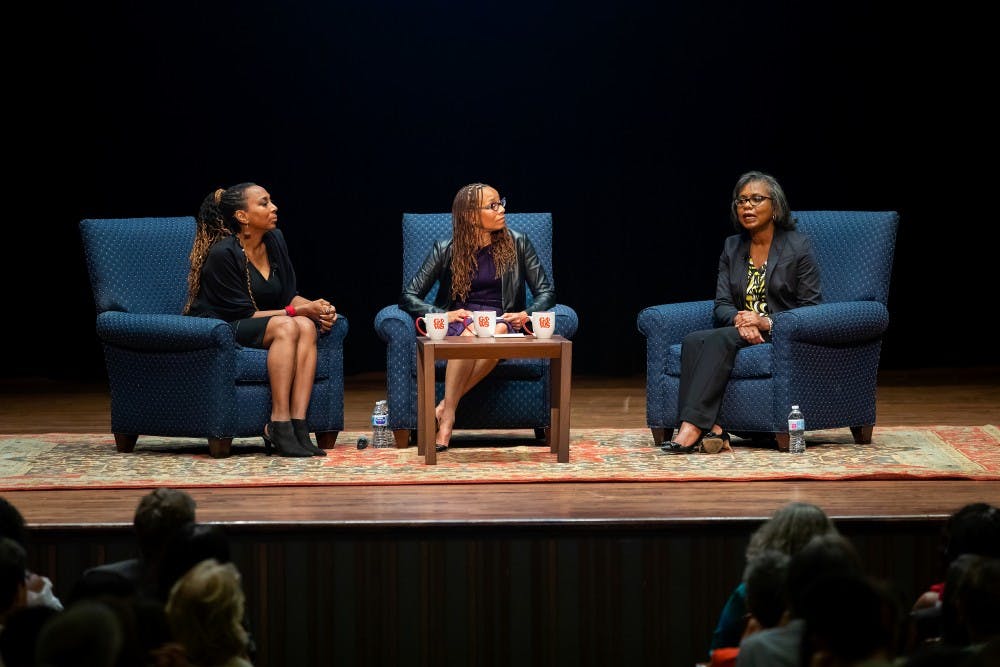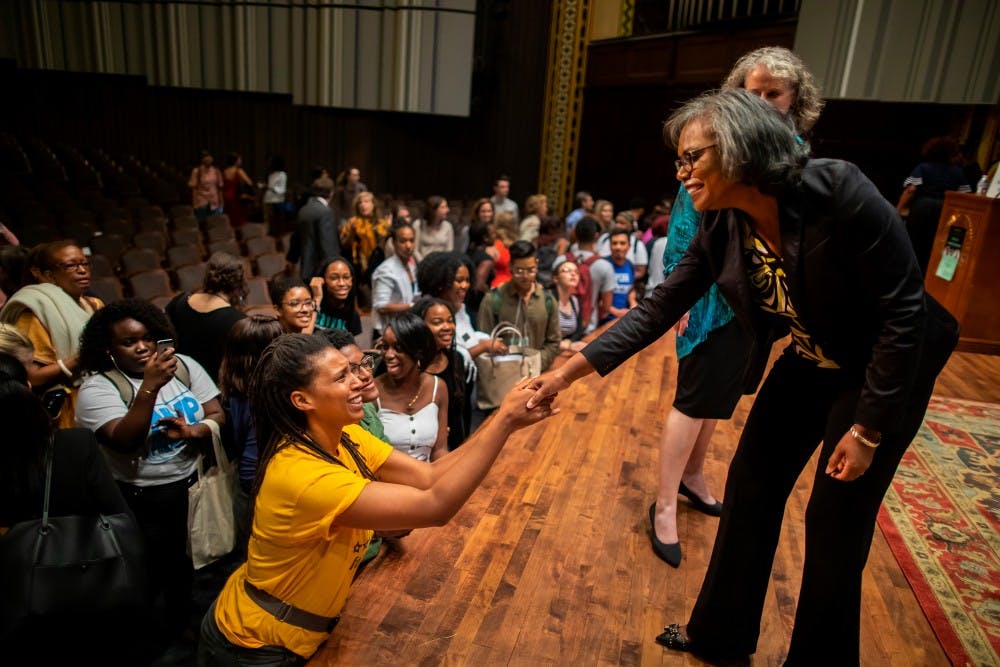
Kimberlé Crenshaw, Dorothy Roberts, and Anita Hill. (Photo by Eric Sucar, University of Pennsylvania)
Twenty-eight years after her last appearance in Irvine Auditorium, Anita Hill told a packed audience of mostly women that the Brett Kavanaugh hearings were a “disservice to the American public” and "really a tragedy."
On Wednesday, Hill likened the recent congressional testimony alleging sexual misconduct by Supreme Court Justice Brett Kavanaugh to her own testimony in 1991, in which she brought forth sexual harassment allegations against current Supreme Court Justice Clarence Thomas during his confirmation hearings.
Her appearance in front of the Senate Judiciary Committee in 1991 has been a topic of public conversation recently, in light of professor Christine Blasey Ford's testimony that she was sexually assaulted by Kavanaugh.
But in light of the hearings' results in 2018, "it’s like we find out it’s almost as though none of that took place,” Hill told the audience.
Welcomed by a standing ovation, Hill dissected the movement to end sexual assault, as well as the Congressional testimonies that alleged sexual harassment and assault.
Kimberlé Crenshaw, a civil rights advocate and a leading scholar of critical race theory who coined the term intersectionality in 1989, joined Hill for the event. It was moderated by Penn Law professor Dorothy Roberts and hosted by the Alice Paul Center and Penn's Gender Sexuality and Women's Studies program.
Hill and Crenshaw analyzed the way the culture around sexual misconduct has both changed, yet remained the same due to structural asymmetry in the political landscape.

Photo by Eric Sucar, University of Pennsylvania
Hill said initially, she saw the Kavanaugh hearings as an opportunity for fair process in a sexual misconduct allegation case, but she soon recognized obstacles similar to ones she experienced during her own testimony.
For example, Hill said in both cases, the Senate did not initially push for an investigation, did not provide ample preparation time for the women bringing forth the allegations, and placed significant restrictions on witnesses that could be called.
“It’s really a tragedy,” Hill said of the lack of witnesses and fact-based questioning at the 2018 hearing. “Their framing of the process and their framing of the questions were not informed by facts and knowledge, and therefore they excluded a whole body of information that has been developed in the past three decades."
Both Hill and Crenshaw however did highlight some important changes that have occurred since Hill’s testimony in 1991. “In Anita’s case it really was a tribunal but it was an imbalanced tribunal,” Crenshaw said. She noted the differences were mainly optic-related, saying an active attempt was made to avoid the perception that Blasey Ford's testimony was imbalanced.
For example, Ford's testimony took place in “a far more intimate room and her family and various supporters were right behind her,” Crenshaw said. Unlike the 1991 testimony, Republicans instituted a woman to conduct further questioning of Ford, and Republicans said “virtually nothing” during Ford’s testimony. “Trump even for like 24 hours didn’t say anything,” she said.
“Even the Democrats got the memo,” she added. “In 1991, the Democrats were at best kind of standoffish. They did not affirm Anita’s testimony; they tried to be impartial.”
At the time of the hearing, Penn professor and former Vice President Joe Biden was the Chair of the Senate Judiciary Committee and has recently been criticized for the way he handled the hearing.
Hill, however, contended that the differences in 2018 were more than just optics and "true substance," noting that there were more women and women of color on the Judiciary Committee. She said the conversation and information available around sexual assault today is very different to that available in 1991.
Both women said that all these positive changes, however, seemed to be rendered unimportant since finding the truth, they said, was not a priority among the hearings' leaders. For example, Hill pointed out that limited FBI investigation did not share every possible witness' perspective to the American public.
Both women also then discussed the prominent role structural inequalities played in leading to the same result in 2018 as 1991.
“We need to understand that what we’re dealing with is not just behavior, we’re dealing with systems that protect it and sometimes encourage it and sometimes reward it,” Hill said. “Ford had no support. There was no organization that was on the inside … that was going to be able to help her.”
Hill said if nothing changes, and if the same structures exist, the country will "end up in the next few decades reliving these sagas."
Both women also discussed the intersectionality of racism and sexism that differentiates Hill's experience. Crenshaw discussed how Hill's identity as a black woman weakened her ability to make a credible claim. College sophomore and attendee Tathagat Bhatia said parts of the talk took him by surprise.
"I think it was amazing to hear the speakers talk about intersectionality. It is something that is never talked about. How it's not about just feminism and race for them but a combination of the two."
Penn Law student Emily Nowlan said recent controversies drove her to attend the event.
"Everything that was going with the Kavanaugh hearing had really brought Anita Hill to the forefront again," Nowlan said. "I thought it was amazing honestly. All the speakers were so eloquent and firm and knowledgeable in their beliefs."
The Daily Pennsylvanian is an independent, student-run newspaper. Please consider making a donation to support the coverage that shapes the University. Your generosity ensures a future of strong journalism at Penn.
Donate







